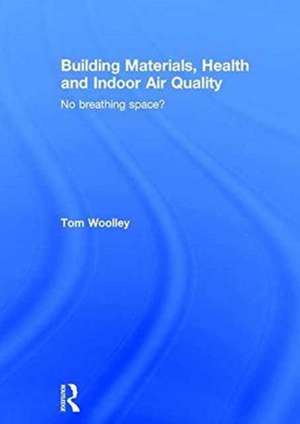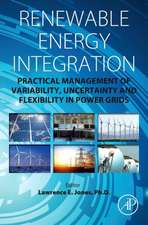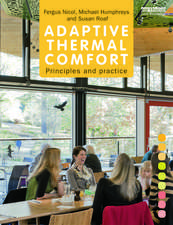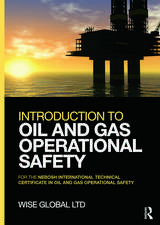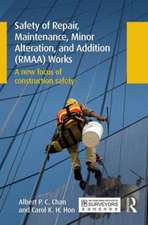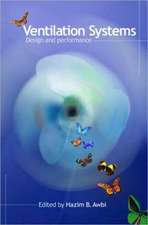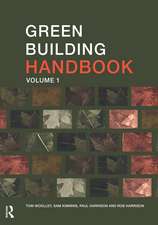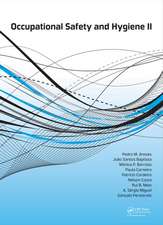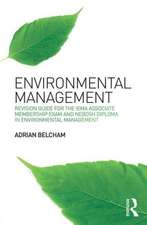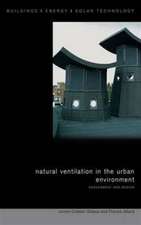Building Materials, Health and Indoor Air Quality: No Breathing Space?
Autor Tom Woolleyen Limba Engleză Hardback – 27 sep 2016
- Ventilation, air conditioning and indoor air quality
- Damp and mould
- Asthma and respiratory problems
- Cancer and endocrine disorders
- Radiation and radon
- Hazardous building materials used in construction
- Indoor air quality and emissions
- Ecological alternatives and approaches and remedies for ‘sick’ buildings
Written in a clear and accessible style, this book provides indispensable advice and information to anyone wishing to better understand healthy buildings and materials. It is essential reading for architects, surveyors, public health professionals, facilities managers and environmentalists.
| Toate formatele și edițiile | Preț | Express |
|---|---|---|
| Paperback (2) | 363.93 lei 22-36 zile | +21.78 lei 5-11 zile |
| CRC Press – 23 mai 2024 | 363.93 lei 22-36 zile | +21.78 lei 5-11 zile |
| CRC Press – 29 sep 2016 | 443.31 lei 43-57 zile | |
| Hardback (2) | 988.54 lei 43-57 zile | |
| CRC Press – 27 sep 2016 | 988.54 lei 43-57 zile | |
| CRC Press – 23 mai 2024 | 1054.71 lei 43-57 zile |
Preț: 988.54 lei
Preț vechi: 1329.80 lei
-26% Nou
Puncte Express: 1483
Preț estimativ în valută:
189.15€ • 198.02$ • 156.51£
189.15€ • 198.02$ • 156.51£
Carte tipărită la comandă
Livrare economică 07-21 aprilie
Preluare comenzi: 021 569.72.76
Specificații
ISBN-13: 9781138934474
ISBN-10: 113893447X
Pagini: 230
Ilustrații: 7
Dimensiuni: 174 x 246 mm
Greutate: 0.54 kg
Ediția:1
Editura: CRC Press
Colecția Routledge
ISBN-10: 113893447X
Pagini: 230
Ilustrații: 7
Dimensiuni: 174 x 246 mm
Greutate: 0.54 kg
Ediția:1
Editura: CRC Press
Colecția Routledge
Public țintă
Postgraduate, Professional, Professional Practice & Development, and UndergraduateCuprins
1. Introduction
2. Volatile Organic Compound Emissions
3. Emissions from materials – Why do we need to use hazardous chemicals?
4. Cancer, Carcinogens and Building Materials
5. Other Hazards and Radiation
6. Hazardous Materials to be avoided and why
7. Mould, Damp, Fuel Poverty and Breathability
8. Ventilation and a critique of Passiv Haus
9. Dealing with problems in existing buildings
10. Healthy building theories
11. How to build healthier buildings
12. Policy Issues for Healthy Buildings – A critical analysis
2. Volatile Organic Compound Emissions
3. Emissions from materials – Why do we need to use hazardous chemicals?
4. Cancer, Carcinogens and Building Materials
5. Other Hazards and Radiation
6. Hazardous Materials to be avoided and why
7. Mould, Damp, Fuel Poverty and Breathability
8. Ventilation and a critique of Passiv Haus
9. Dealing with problems in existing buildings
10. Healthy building theories
11. How to build healthier buildings
12. Policy Issues for Healthy Buildings – A critical analysis
Recenzii
"The book offers a phenomenally well-researched and worrying insight into the indoor air quality issues that hazardous substances create."
—Health and Safety at Work, March 2017
As industry and regulation increasingly focus on energy and carbon saving to fulfil our environmental responsibility, this book is a timely reminder that the quality of the buildings we occupy has to be given the same importance as energy performance. In this book Professor Woolley revisits his previous excellent research in toxicity and materials by delivering a book that will be vital in addressing the issues of health and our built environment for practitioners and students alike.
Alison Pooley, Anglia Ruskin University
For quite some time issues of the outdoor environment and climate change have overshadowed the issue of indoor air quality. Woolley presents a range of evidence showing that the indoor air quality problem remains highly pertinent, and largely ignored not only by public authorities and the construction industry, but also unfortunately by several health - and environmental organizations.
Modern solutions for energy efficient buildings, such as the passive house, potentially amplify this problem through increased focus on impermeability, new insulation materials and balanced ventilation system with heat recovery.
But Woolley shows us the way forward. He documents with great experience and thoroughness that there is no contradiction between high energy efficiency and good indoor air quality. Proposed solutions include the use of low-emitting materials, hygroscopic surfaces and natural ventilation.
This knowledge is deeply valuable to anyone interested in indoor air quality.
Bjørn Berge, Gaia Architects
A powerful plea to to make better choices about the products we use and the way we build. This book is a wake-up call for anyone who believes it possible to deliver healthy buildings without challenging the dependence on complex industrial chemicals.
Gary Newman, Alliance for Sustainable Building Products
"The book offers a phenomenally well-researched and worrying insight into the indoor air quality issues that hazardous substances create."
Health and Safety at Work, March 2017
—Health and Safety at Work, March 2017
As industry and regulation increasingly focus on energy and carbon saving to fulfil our environmental responsibility, this book is a timely reminder that the quality of the buildings we occupy has to be given the same importance as energy performance. In this book Professor Woolley revisits his previous excellent research in toxicity and materials by delivering a book that will be vital in addressing the issues of health and our built environment for practitioners and students alike.
Alison Pooley, Anglia Ruskin University
For quite some time issues of the outdoor environment and climate change have overshadowed the issue of indoor air quality. Woolley presents a range of evidence showing that the indoor air quality problem remains highly pertinent, and largely ignored not only by public authorities and the construction industry, but also unfortunately by several health - and environmental organizations.
Modern solutions for energy efficient buildings, such as the passive house, potentially amplify this problem through increased focus on impermeability, new insulation materials and balanced ventilation system with heat recovery.
But Woolley shows us the way forward. He documents with great experience and thoroughness that there is no contradiction between high energy efficiency and good indoor air quality. Proposed solutions include the use of low-emitting materials, hygroscopic surfaces and natural ventilation.
This knowledge is deeply valuable to anyone interested in indoor air quality.
Bjørn Berge, Gaia Architects
A powerful plea to to make better choices about the products we use and the way we build. This book is a wake-up call for anyone who believes it possible to deliver healthy buildings without challenging the dependence on complex industrial chemicals.
Gary Newman, Alliance for Sustainable Building Products
"The book offers a phenomenally well-researched and worrying insight into the indoor air quality issues that hazardous substances create."
Health and Safety at Work, March 2017
Descriere
The impact of building materials and construction methods on the health and wellbeing of occupants is often underestimated. This book is an essential guide to understanding and avoiding hazardous materials and poor air quality in buildings.
Notă biografică
Professor Tom Woolley is an architect with extensive practice experience in Scotland and London, specialising in the renovation of old buildings and working with community groups. He is former Professor of Architecture at Queens University, Belfast, Editor of the award- winning Green Building Digest, and former Chairman of the Northern Ireland Building Regulations Advisory Committee and former member of the Ministerial Advisory Committee. He is the author of numerous books including Building Materials, Health and Indoor Air Quality, Routledge, 2016.
